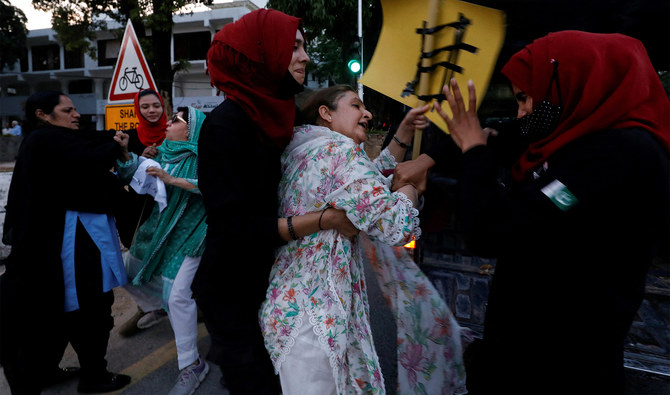ISLAMABAD: Islamabad Police have denied “rumors” they tortured women detainees after the daughter of a close aide of former Prime Minister Imran Khan said her mother Shireen Mazari, 72, was beaten up in police custody and rearrested on Tuesday night despite a court ordering her release.
Khan was arrested in a land fraud case last Tuesday, prompting violent protests across the country. He was later released and received bail from a court in Islamabad for two weeks but many senior leaders of his party, including Shah Mahmood Qureshi, Asad Umar, Shireen Mazari and Yasim Rashid, remain behind bars.
Khan’s PTI party says 7,000 supporters and leaders, including women, have been arrested following the protests against the ex-PM’s arrest.
On Tuesday, the Islamabad High Court separately granted bail to top Khan aide Chaudhry Fawad Hussain and declared Mazari’s detention “illegal,” ordering her immediate release.
However, her daughter Imaan Mazari-Hazir said her mother had been “tortured and rearrested.”
“Rumors about the torture of women [in custody] are based on propaganda.,” Islamabad police said on Twitter, saying all arrests were being made “in accordance with the law.”
Khan’s party has repeatedly alleged many of its supporters and leaders have been subjected to ill treatment inside jails. Police deny this.
Within hours of Khan’s detention last Tuesday, his supporters torched vehicles and buildings and attacked police and military facilities to express their fury over the treatment of the 70-year-old opposition leader.
Top civilian and military leaders of Pakistan met on Tuesday and vowed to take a “zero-tolerance” policy against violence in the country.
“Those who planned, executed and abetted the vandalism on May 9 certainly committed an act of terrorism,” Prime Minister Shehbaz Sharif said in televised comments after the NSC meeting in Islamabad.
“They should be brought to justice at any cost, and even if the prime minister says to release someone, refuse to comply with the prime minister’s order.”
















